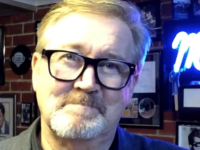Alright, confession time. There are large areas of the musical landscape I listen to pretty regularly but haven’t written about and probably never will. And there’s various reasons for that.
For instance, popular releases are bound to be well covered elsewhere, adding my thoughts to it just seems redundant. Then there is the time factor, as in, so much music, so little time. But there’s also music I enjoy but don’t understand fully enough to articulate how I feel about it.
The third reason is a good explanation of why I hadn’t really discussed progressive rock until now. I’ve been into it since it’s seventies heyday, but there’s always a fine line between artistry and pretentiousness. I’m not about to dissect nineteen minute, multi-suite rock symphonies to try and make a call as to which side of the fence it falls on. If it sounds good to me, I’m just gonna enjoy the ride and not worry about it.
So yeah, I dig me some King Crimson, Yes, ELP, early Genesis, Soft Machine and some of the various spinoff groups. That said, it’s impossible to enjoy all of it; they did get a little full of themselves at some point.
The nineties saw a sort of a resurgence of the classic prog rock sound and newer bands like Porcupine Tree, Spock’s Beard, The Flower Kings, Ozric Tentacles and Echolyn are among those I can get into on most days. (Dream Theater is another obvious mention but they sound too metal for my tastes, although Mike Portnoy is a phenomenal drummer).
Some of these neo-prog bands are almost carbon-copy throwbacks to the sounds of a generation ago; others make a good attempt for bringing the genre forward.
Spock’s Beard probably falls more into the former category. They wear their Yes influences on their sleeves.
The good news is that in spite of being largely unoriginal, they are all fine musicians who can recreate the drawn out, constantly shifting pieces sprinkled with melodic folk interludes of the classic Yes period with near perfection, and it’s leader Neal Morse is a better than average vocalist and a superb songwriter. Since there’s no more Close To The Edge‘s forthcoming from Yes, this is as good as it’s going to get insofar as “new” classic Yes is concerned.
Morse left the band after 2002’s thematic opus Snow, but around the same time the band released a DVD twofer set Don’t Try This At Home/The Making Of V. The first DVD contains live concert footage, while the second DVD chronicles the making of 2000’s CD release V. Oh, and there’s a bonus 3rd CD, an audio disc full of outtakes, acoustic versions, and demos.
It also has Spock’s Beard most direct tribute to their forefathers, a cover of Yes’ “South Side Of The Sky.” This track can also be found in a limited edition bonus companion CD to Snow.
“South Side Of The Sky” happens to be my favorite Yes song, so hearing a rare cover of it piqued my interest. The original closed out side one of Yes’ 1972 breakthrough Fragile album. It’s hard to explain why I like it so much…I did say that prog music is probably better left undissected…but it seemed to pull together all of the bands strengths. The ensemble playing, the gorgeous harmony vocals and that masterly mash-up between grounded English folk and unbound space-rock.
Then there’s that sublime classically-styled piano solo smack dab in the middle of the song by keyboard wunderkind Rick Wakeman. Even as a member of the Wakeman Is Too Indulgent Club, I thought he produces a perfectly understated, thoughtful creation that provides stark relief to Steve Howe’s staccato guitar that precedes and follows it.
Since this song is one I don’t think needs much messing with, it was nice to discover that Spock’s Beard evidently agreed and didn’t deviate all that dramatically from the original. The snow storm sound effect is replicated and Morse’s voice is even phased out at the end of every refrain early seventies style, just like Jon Anderson’s (“It seemed from all eterni-teeeeeeee…yah!”). This is a cleaner, more aggressive sounding 21st century recording, but the arrangement is nearly identical.
That said, there are some real distinctions with SB’s rendition. First of all, it’s set to a lower key, since Morse’s voice isn’t as high pitched as Anderson’s. Secondly, the song begins and ends with a bombastic interval not part of the original, complete with heavy vintage sounding synth and a Chris Squire-like bass staggering line synced perfectly with the drum shots.
Most notably, however, Wakeman’s piano solo is replaced with a classical acoustic guitar. It’s like as if the band decided that the solo was too sacred to touch and opted to refer to it indirectly; thus, the classical guitar replacing the classical piano. Like to 1972 version, it doesn’t seem too long even at nine minutes.
Come to think of it, nine minutes isn’t that long for this kind of music, anyway.
Purchase Spock’s Beard Don’t Try This At Home/The Making Of V
“One Track Mind” is a weekly drool over a single song selected on a whim and a short thesis on why you should be drooling over it, too.



